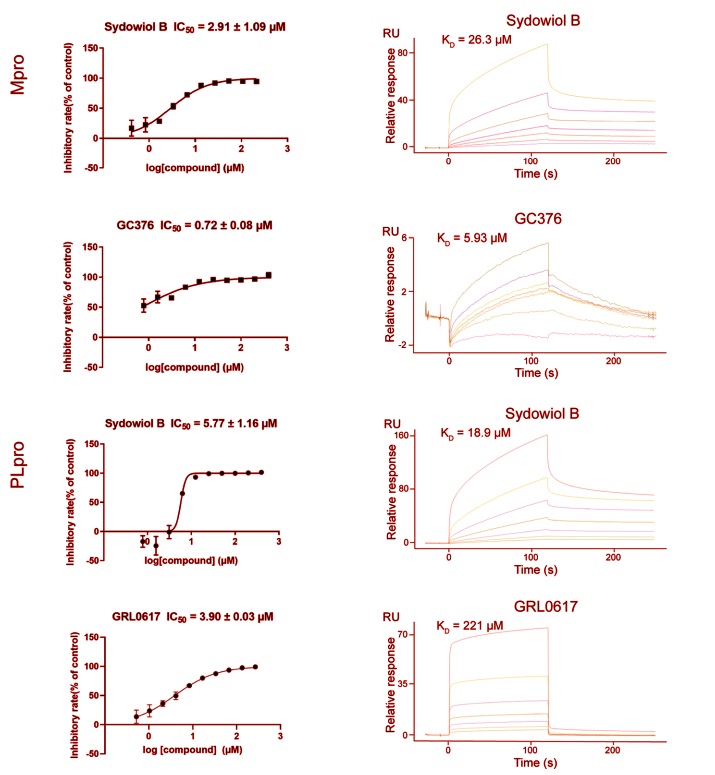Natural Bioactive Compounds from Fungi Exhibit Dual-Inhibitory Effects on SARS-CoV-2 Proteases
Nikhil Prasad Fact checked by:Thailand Medical News Team Jan 04, 2025 11 months, 3 weeks, 1 day, 18 hours, 26 minutes ago
Medical News: In a groundbreaking study, researchers have uncovered the potential of two natural bioactive compounds, sydowiol B and violaceol I, to combat coronaviruses including SARS-CoV-2. These compounds are derived from unique marine and fungal sources. Sydowiol B is extracted from the East China Sea marine-derived fungus, Aspergillus sydowii, while violaceol I comes from the endophytic fungus Trichoderma polyalthiae. Both compounds have demonstrated promising dual-inhibitory effects on key SARS-CoV-2 proteases. This
Medical News report explores their mechanism of action and the implications for future antiviral treatments.
 Sydowiol B and violaceol I are dual inhibitors of SARS-CoV-2 Mpro and PLpro. The Inhibitory activity (IC50 values) and binding afnity of sydowiol B against Mpro and PLpro.
Sydowiol B and violaceol I are dual inhibitors of SARS-CoV-2 Mpro and PLpro. The Inhibitory activity (IC50 values) and binding afnity of sydowiol B against Mpro and PLpro.
The study was conducted by a collaborative team of scientists from Huazhong University of Science and Technology, Tongji Medical College, and Zhengzhou University. Their work highlights the ongoing importance of natural products in addressing global health crises like COVID-19.
Background on SARS-CoV-2 and the Need for Novel Therapies
The COVID-19 pandemic has been one of the most disruptive events of the 21st century, causing millions of deaths and reshaping societal norms. Despite the decline in cases, the threat of future coronavirus outbreaks remains. Vaccines and current therapeutic options, such as remdesivir and paxlovid, face challenges due to mutations in the virus. This has led researchers to explore alternative solutions, including compounds targeting the virus’s conserved proteases.
The SARS-CoV-2 genome encodes two essential proteases - the main protease (Mpro) and papain-like protease (PLpro) - which play critical roles in viral replication. Targeting these proteases offers a promising strategy for antiviral drug development. Natural products have historically been a treasure trove for pharmaceutical innovations, and this study demonstrates their continued relevance.
Mechanisms of Action: Sydowiol B and Violaceol I
Dual Inhibitory Effects
High-throughput screening identified sydowiol B and violaceol I as potent inhibitors of both Mpro and PLpro. Sydowiol B binds at the nano-channel of the Mpro dimer interface, a conserved site among coronavirus variants. Molecular dynamics simulations revealed that this binding limits the expansion of the active site, effectively reducing the protease’s ability to process viral proteins.
Violaceol I, while less potent than sydowiol B, also showed significant inhibitory effects.
For PLpro, sydowiol B binds directly to the active site, inducing structural changes that disrupt its functionality. Notably, this binding destabilizes the zinc finger domain, critical for the protease’s activity, leading to the displacement of zinc ions to the S2 helix. This unique mechanism not only inhibits the protease but also prevents it from interacting with host proteins like ubiquitin and ISG15, which are essential for viral e
vasion of the immune system.
Antiviral Spectrum
Both compounds exhibited broad-spectrum antiviral activity. In vitro tests against human coronavirus OC43 (HCoV-OC43) showed that sydowiol B and violaceol I effectively reduced viral replication at micromolar concentrations. Their dual-targeting approach makes them robust candidates against multiple coronaviruses, including SARS-CoV and MERS-CoV.
Study Findings in Detail
The research team employed a combination of molecular docking, enzymatic assays, and molecular dynamics simulations to elucidate the interactions between the compounds and the proteases. Key findings include:
-Binding Affinity: Sydowiol B exhibited IC50 values of 2.91 μM for Mpro and 5.77 μM for PLpro, comparable to existing inhibitors like GC376 and GRL0617.
-Mechanistic Insights: Molecular dynamics simulations confirmed that sydowiol B’s binding to the nano-channel of Mpro disrupts its structural integrity, preventing efficient substrate processing. For PLpro, the compound’s binding altered the structural stability of the zinc finger domain.
-Broader Implications: These compounds’ ability to target conserved sites on the proteases suggests their potential as broad-spectrum antiviral agents, effective against current and emerging coronavirus variants.
Challenges and Future Directions
While the results are promising, there are challenges to overcome. Both sydowiol B and violaceol I exhibit poor absorption and distribution profiles, as identified through ADMET (absorption, distribution, metabolism, excretion, and toxicity) analysis. Optimization of their chemical structures is needed to enhance their drug-like properties.
Researchers propose incorporating hydrophobic groups to balance the compounds’ polarity and improve their pharmacokinetic profiles. Additionally, further in vivo studies and clinical trials are necessary to validate their safety and efficacy.
Conclusion
This study highlights the potential of natural marine-derived compounds as innovative solutions to viral threats. Sydowiol B and violaceol I’s dual-inhibitory effects on SARS-CoV-2 proteases underscore their promise as broad-spectrum antiviral agents. By targeting conserved protease sites, these compounds could provide robust defenses against both current and future coronavirus outbreaks.
The findings pave the way for further exploration of marine and fungal natural products in drug discovery. As researchers refine these compounds for clinical use, the global health community may soon benefit from these groundbreaking advancements.
The study findings were published in the peer-reviewed journal: Natural Products and Bioprospecting.
https://link.springer.com/article/10.1007/s13659-024-00486-4
For the latest COVID-19 News, keep on logging to Thailand
Medical News.
Read Also:
https://www.thailandmedical.news/news/shictin-a-novel-lectin-from-shiitake-mushrooms-shows-promise-in-combating-covid-19-omicron-variant
https://www.thailandmedical.news/news/french-study-finds-that-a-phytochemical-from-st-john-s-wort-shows-promise-as-a-broad-spectrum-antiviral-against-coronaviruses
